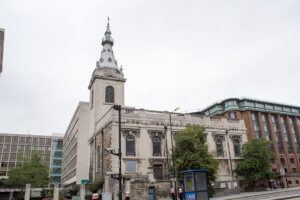
Imperfect Vessels
 Thank you, Margaret, for such a thoughtful and nuanced reading of Jeremiah’s difficult Old Testament parable about the potter’s work at the wheel, forming vessels out of clay. With our three difficult and confusing readings, I’ve wished a thousand times that someone else were preaching today. Jeremiah’s parable of the potter puts harsh words in God’s mouth: Look, I am a potter shaping evil against you and devising a plan against you, Jeremiah’s prophecy warns. It almost sounds like God has joined the other team.
Thank you, Margaret, for such a thoughtful and nuanced reading of Jeremiah’s difficult Old Testament parable about the potter’s work at the wheel, forming vessels out of clay. With our three difficult and confusing readings, I’ve wished a thousand times that someone else were preaching today. Jeremiah’s parable of the potter puts harsh words in God’s mouth: Look, I am a potter shaping evil against you and devising a plan against you, Jeremiah’s prophecy warns. It almost sounds like God has joined the other team.
And then Luke’s gospel surprises us this morning with this shockingly straightforward announcement: Whoever comes to me and does not hate father and mother, wife and children, brothers and sisters, yes, and even life itself, cannot be my disciple. And then there’s that whole give up all your possessions thing. Is this the same Jesus who says suffer the little children to come unto me, and tells us to love God with all our heart, mind, and strength, and love our neighbor as ourselves? Confusingly, yes. Same Jesus, same gospel even. How do we make sense of these seemingly different messages from God? For me, putting the words hate and evil in God’s mouth is really problematic, and I’ve always had trouble with this particular gospel that seems to say that hating our closest family members is a condition precedent to discipleship.
Relationship
And that … that is the incredibly frustrating, but ultimately spiritually satisfying — even thrilling — beauty of being a lectionary preacher, that is, a preacher whose tradition uses a specific collection of Old Testament, New Testament, and Gospel readings every Sunday. A lectionary preacher can’t avoid looking a disturbing reading in the eye, or skip a passage that is confusing, or that challenges her cultural paradigms, or even her foundational understanding of God. This lectionary discipline of scripture — the story of humanity’s relationship with God — is where we work out our relationship with God, each other, and with the planet, when each of us is made so very differently in God’s image.
In the Jeremiah reading, as Duke Old Testament professor Jo Bailey Wells points out, the whole point of the passage is the potter’s — God’s — relationship with the clay on the potter’s wheel, not God’s strong warnings to the clay vessel he fashions. Scripture is full of stories where the clay on the potter’s wheel answers the potter: From Job: Remember that you fashioned me like clay; and will you turn me to dust again? Or from Isaiah: Does the clay say to the one who fashions it, ‘What are you making?’ or ‘Your work has no handles.’”
The Art of Congregational Life
In Jeremiah 18, this morning’s reading, it is the very resistance and responsiveness of the clay — that’s us — that  matters. St. Martin-in-the-Fields vicar Sam Wells also writes about God’s work in forming us in what he calls the art of congregational life. The gospel is not about striving to return to some kind of unblemished perfection, he writes. It’s about trusting the Trinity to bring us into renewed relationship with God [and] with one another, … [transforming]… our nature by the riches of God’s grace. The art of congregational life is about starting with who we are and what life has given and done to us, and discovering together, through the imagination of God, a form we would never otherwise have assumed.
matters. St. Martin-in-the-Fields vicar Sam Wells also writes about God’s work in forming us in what he calls the art of congregational life. The gospel is not about striving to return to some kind of unblemished perfection, he writes. It’s about trusting the Trinity to bring us into renewed relationship with God [and] with one another, … [transforming]… our nature by the riches of God’s grace. The art of congregational life is about starting with who we are and what life has given and done to us, and discovering together, through the imagination of God, a form we would never otherwise have assumed.
Our gospel reading this morning grabs our attention just like the Old Testament lesson did with Jesus’ shocking warning that Whoever comes to me and does not hate father and mother, wife and children, brothers and sisters, yes, and even life itself, cannot be my disciple. What do we do with that? The Book of Genesis gives us the story of Jacob, our ancestor in the faith, who loved his wife Rachel and hated his wife Leah. We know from the rest of the story that Jacob did not have actual animosity or ill will toward Leah. Remember Rachel and Leah’s father, Laban, tricked Jacob, requiring him to work seven years for the right to marry Rachel and then at year seven substituted Leah as Jacob’s bride, requiring Jacob to work another seven years for right to marry the sister he bargained for in the first place. In this context, Jacob’s love for Rachel and hatred for Leah is an intense statement of preference — and a marker for Laban’s trickery in dealing with Jacob — not animosity or ill-will.
Nonetheless, hate is a very strong word, especially when applied to our very closest relations, and even life itself, as today’s gospel clearly says. This is meant to be a mic-drop moment, to make sure we’re all really listening. It’s supposed to break through all of our contexts and different cultural understandings to shock us out of our complacency no matter what our past experiences are. This is the lowest common denominator of attention grabbers, meant to find us all where we live.
Discipleship Over All Human Relationships
AME preacher Bill Lamar writes, The word translated as hate does not mean anger or hostility. The implication is rather that when conflicts arise as a result of discipleship—and arise they will—discipleship must be chosen over all human relationships. Does Jesus’ strongly worded statement on the cost of discipleship require us to shun our closest relatives? Absolutely not. Remember the context of everything else Jesus says and does, even — and especially — in Luke’s own gospel, where Jesus is preaching, teaching, healing, casting out demons, forgiving, inviting, and feeding — all without judgment or exclusion. That is what discipleship is, and there’s not a word of animosity or a breath of ill-will in that. This story is Jesus’ mic-drop moment, his attention-grabber that’s designed to shock us, whoever, whenever, wherever we are, no matter what our context. Discipleship is important, so important that you should choose it even if it costs everything. That’s the message.
Understanding that discipleship is so important that we s hould choose it even if it costs everything, what does discipleship look like for us in these times at Emmanuel? When Jere and I were in London, we walked along the Thames River from the tube stop at Embankment, near the Westminster Bridge, to the Tower of London down by the London Eye. We wanted to see the wildflowers blooming in the moat, which were just gorgeous. But what we saw along the way really caught my eye as a possibility for how we can include more people from more places more of the time in our community life at Emmanuel.
hould choose it even if it costs everything, what does discipleship look like for us in these times at Emmanuel? When Jere and I were in London, we walked along the Thames River from the tube stop at Embankment, near the Westminster Bridge, to the Tower of London down by the London Eye. We wanted to see the wildflowers blooming in the moat, which were just gorgeous. But what we saw along the way really caught my eye as a possibility for how we can include more people from more places more of the time in our community life at Emmanuel.
St. Nicholas Cole Abbey, a church dating back to the 12th century and rebuilt by Christopher Wren in the 17th century after the Great Fire of London, and then restored again last century after being destroyed in the Blitz, offers a lunchtime ministry — The Wren Cafe — for workers in that area of the City. They serve coffees, pastries, sandwiches, and soups, in the nave of this beautiful 17th century Wren interior, which holds a bookstore, reading room, and conversation area.
Later, back in Trafalgar Square, we visited St. Martin-in-the-Fields, which is well-known worldwide for its classical music broadcasts and concerts by the Academy of St. Martin in the Fields, as well as its homeless ministry, cafe gathering workers and tourists from the area, its role as a meeting and training center, and its direct engagement in important conversations through all kinds of difference — in other words, its public theology, or church in the public square.
How will we at Emmanuel take on discipleship? How will we at Emmanuel enter into responsive relationship with God as we gamely take on the lectionary texts that shock us, as we form relationship with each other through difference in experience, perspective, and culture, and as the potter turns us into vessels of the spirit on God’s potter’s wheel? I don’t know, but we are the home of a world-renowned classical music performance entity, and we have beautiful, acoustically significant interior spaces, one of the loveliest Arts and Crafts period gathering rooms in the region, and a really nice, upgraded kitchen. Does anyone smell croissants baking and coffee brewing? Amen
